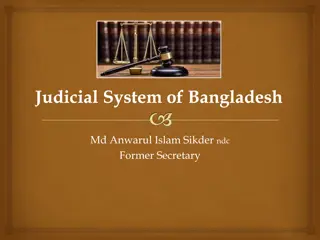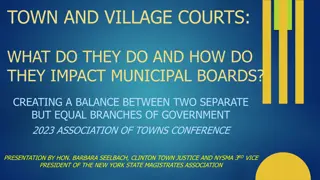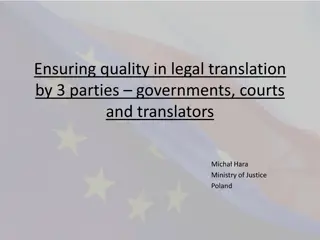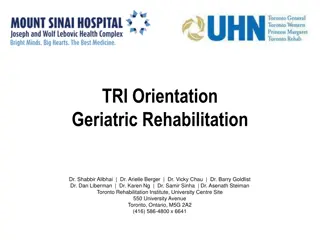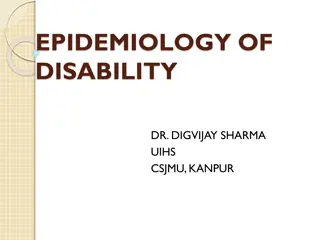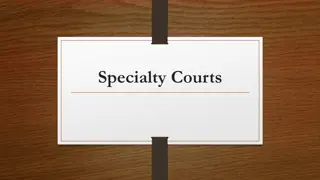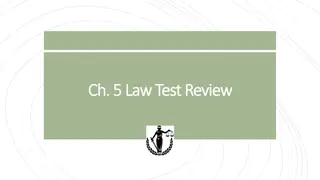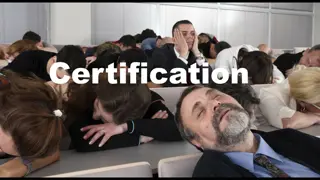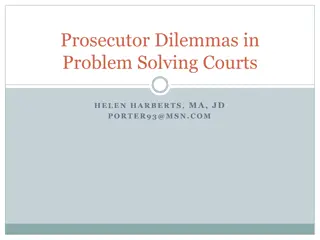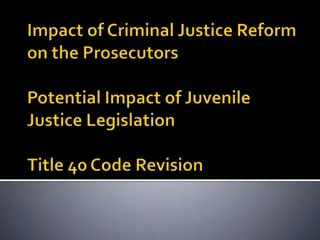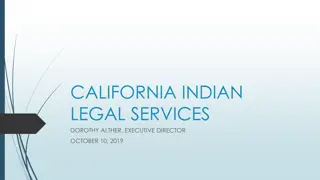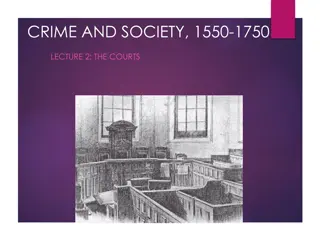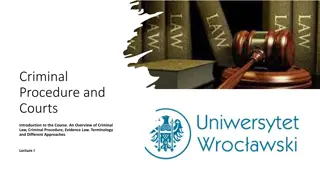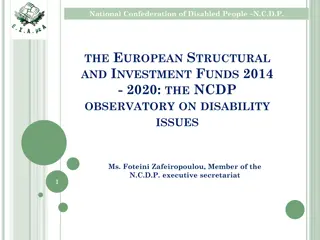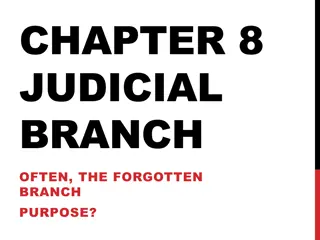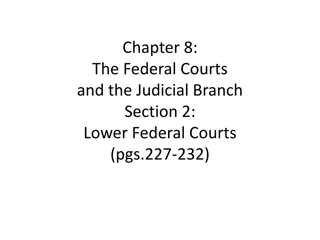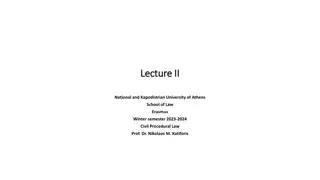Disability Access in California Courts: Pandemic Considerations and Legal History
This presentation on disability access in California courts, including pandemic-related considerations, covers relevant laws like Title II of the ADA and Section 504, historical developments such as the ADA enactment, and rules ensuring non-discrimination and accessibility in court proceedings. It also addresses basic principles like reasonable modifications and effective communication for individuals with disabilities, along with defenses like undue burden and fundamental alteration. The coverage extends to who is covered under these regulations, including parties, witnesses, lawyers, jurors, and others interacting with state courts.
Download Presentation

Please find below an Image/Link to download the presentation.
The content on the website is provided AS IS for your information and personal use only. It may not be sold, licensed, or shared on other websites without obtaining consent from the author. Download presentation by click this link. If you encounter any issues during the download, it is possible that the publisher has removed the file from their server.
E N D
Presentation Transcript
DISABILITY ACCESS IN CALIFORNIA COURTS INCLUDING PANDEMIC-RELATED CONSIDERATIONS Presented by: Claudia Center, Legal Director Elaine Lewis, Staff Attorney
TRAINING OVERVIEW Laws and legal history CRC Rule 1.100 Court accommodations in practice
RELEVANT DISABILITY RIGHTS LAWS Title II of the ADA, 42 U.S.C. 12131 et seq. Section 504, 29 U.S.C. 794 California Government Code 11135 See also CRC Rule 1.100
LEGAL HISTORY 1990: Enactment of ADA 1994: Access and Fairness Advisory Committee of California Judicial Council Subcommittee on Access for People with Disabilities 1995: Subcommittee reviews access in California courts, issues findings re access barriers
LEGAL HISTORY 1996: Judicial Council adopts Rule 989.3 2005: Judicial Council clarifies that rule matches California s more expansive disability laws, including 2000 amendments 2007: Renumbered as Rule 1.100
BASIC PRINCIPLES Nondiscrimination on the basis of disability Programs and services must be readily accessible to and usable by individuals with disabilities, 28 C.F.R. 35.150 New buildings and construction must meet that standard and specific access guidelines, 28 C.F.R. 35.151
BASIC PRINCIPLES (CONT.) Reasonable modifications of policies, practices and procedures, 28 C.F.R. 35.130(b)(7) Effective communication with auxiliary aids and services, 28 C.F.R. 35.160-164 Such as ASL, real time captioning, 28 C.F.R. 35.104. No surcharge, 28 C.F.R. 35.130(f)
DEFENSES Undue burden Fundamental alteration 28 C.F.R. 35.150(a)(3), 35.164 And in context of court cases, consider due process to other party
WHO IS COVERED? Parties Witnesses Lawyers Jurors Others who interact with the state courts
IMPLEMENTATION RULE 1.100 Each state court must name ADA coordinator to address requests for accommodations, Rule 1.100(b) Could be a court clerk, jury commissioner, designee, also called access coordinator Accommodations requests must be given to this person, Rule 1.100(c)(1)
RULE 1.100: REQUESTING ACCOMMODATION Requests for accommodations may be submitted via: Form MC 410 or another written request Oral requests: Call the court Go in person to speak to the ADA Coordinator or designated person. Rule 1.100(c)(1)
RULE 1.100: REQUESTING ACCOMMODATION (CONT.) Practice Note: A written request is strongly preferred over an oral request. Practice Note: Do not file or e-file the form MC-410 or other request document. In most situations, MC-410 is a confidential form that is not part of the case file. Give the document to the ADA coordinator.
RULE 1.100: REQUESTING ACCOMMODATION (CONT.) Requests must include: description of accommodation sought, and statement of the medical condition that necessitates the accommodation Court may require additional information about the medical condition Rule 1.100(c)(2)
RULE 1.100: REQUESTING ACCOMMODATION (CONT.) Make request as far in advance as possible, and no later than 5 court days before requested implementation date, Rule 1.100(c)(3) May be exceptions to five-day rule
RULE 1.100 CONFIDENTIALITY Court must keep confidential unless: waived in writing by applicant, or disclosure required by law Confidential: applicant s identity, medical information, all communications from applicant about request for accommodation Court may not disclose to public or persons other than those involved in the accommodation process, Rule 1.100(c)(4)
RULE 1.100 CONFIDENTIALITY (CONT.) Exception: In case regarding trial continuance requested by disabled litigant, court of appeals ruled that opposing party was person involved in the accommodation process and permitted to see documents and be heard, Vesco v. Superior Court, 221 Cal. App. 4th 275 (2013) Note: Judicial Council interprets Vesco to apply only to requests for continuances that affect other parties
RULE 1.100: RESPONSE Court must promptly inform the applicant of the determination to grant or deny accommodation, Rule 1.100(e)(2) If accommodation denied in whole or in part, response must be in writing, Rule 1.100(e)(2) On request of the applicant, court may also provide response in alternative format, Rule 1.100(e)(2)
RULE 1.100: RESPONSE (CONT.) Response must include (Rule 1.100(e)(2)): Whether granted or denied, in whole or in part, whether alternative granted; Reason for any denial; Nature and duration of accommodation to be provided; If response in writing, the date it was delivered in person or sent to applicant
RULE 1.100: REVIEW If request was denied by a court staff person (not a judge or judicial officer): Make written request for review by presiding judge or designated judicial officer within 10 days of date of hand-delivery or mailing of denial, Rule 1.100(g)(1) Give written request for review to ADA coordinator or judge, see Judicial Council Factsheet
RULE 1.100: REVIEW (CONT.) If request was denied by a judge or judicial officer: File a Petition for Writ of Mandate within 10 days of date of hand-delivery or mailing of denial, Rule 1.100(g)(2), still confidential, Rule 1.100(g)(3) Reviewing body (see Advisory Committee Comment): Appellate division of the superior court (for limited civil or misdemeanor/ infraction in superior court) Court of Appeal (for all other superior court cases) California Supreme Court (for denials in Court of Appeal)
EXAMPLES OF ACCOMMODATIONS Make changes to policies or procedures: Reassign a hearing to an accessible site, or Adjust schedules (as long as core legal deadlines are not missed) Permission to bring emotional support animal to court Provide auxiliary aids and services Assistive listening devices Computer-assisted real-time transcription (CART) Reader for someone with vision loss Sign language interpreter
EXAMPLES OF ACCOMMODATIONS (CONT.) Biscaro v. Stern, 181 Cal. App. 4th 702, 710 (2010) (reversing where trial court failed to rule on request for accommodation) Duvall v. Cty. of Kitsap, 260 F.3d 1124, 1142 (9th Cir. 2001) (reversing summary judgment in suit for damages where state court refused real-time captioning)
PANDEMIC-RELATED ACCOMMODATION EXAMPLES Requests for Remote Videoconference Hearings Videoconferencing widely used in state courts during pandemic, see e.g. Emergency Rules Related to COVID- 19 (Dec. 7, 2020), Rule 3. Use of technology for remote appearances, https://www.courts.ca.gov/43820.htm Pre-COVID authority: Hiramanek v. Clark, No. 5:13-cv-00228-RMW (N.D. Cal. Feb. 19, 2016) (telephonic appearances at routine pre- trial hearings is not fundamental alteration, but would be for evidentiary hearings or trial)
PANDEMIC-RELATED ACCOMMODATION EXAMPLES (CONT.) Pre-COVID authority (cont.): Phiffer v. Shirtcliff, No. CV-10-1120-SU (D. Or. Apr. 14, 2011) (refusal to consider request to waive in- person attendance at hearing stated claim under ADA) See also Vilchez v. Holder, 682 F.3d 1195, 1199 (9th Cir. 2012) (noting issues re credibility and demeanor)
PANDEMIC-RELATED ACCOMMODATION EXAMPLES (CONT.) Requests for Continuances of Trials and Hearing Dates Vesco v. Superior Court, 221 Cal. App. 4th 275 (2013) In re Marriage of James & Christine C., 158 Cal. App. 4th 1261 (2008) (trial continuance may be required when party with a mental disability is unable to proceed)
SAMPLE CONTINUANCE ACCOMMODATION REQUEST This is a reasonable accommodation request to postpone a hearing on a child custody matter. Pursuant to California Rule of Court, rule 1.100. Defendant requests that the continuance be granted until she is able to obtain the COVID-19 vaccine. Until then, requiring the Defendant to attend an in-person jury trial will force her to risk her health and her life due to her disabilities. A continuance is reasonable under these circumstances and would allow Defendant full and equal access to the judicial system as a disabled person.
COURT REPORTER AND TRANSCRIPT ACCESS The California Supreme Court held in 2018 that state courts must make court reporters and transcripts (or other means to create verbatim record) available to in forma pauperis parties (those who are eligible for fee waivers) upon request. Jameson v. Desta, 5 Cal. 5th 594, 599749 (2018)
RESOURCES Disability Accommodations in California Courts, https://www.courts.ca.gov/documents/Disability- Accommodations-in-California-Courts.pdf MC-410 Disability Accommodation Request Form, https://www.courts.ca.gov/documents/mc410.pdf
RESOURCES (CONT.) Judicial Council Q&A, https://www.sb- court.org/sites/default/files/General%20Information/QA RuleOfCourt1_100.pdf Greater Los Angeles Agency on Deafness, Inc., MC- 410: Requesting Accommodations in Court, https://www.youtube.com/watch?v=ViOy8c7FOa0
THANK YOU AND QUESTIONS Claudia Center Email: ccenter@dredf.org Elaine Lewis Email: aelewis@dredf.org


